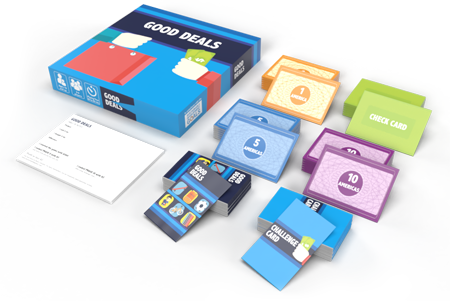
At least three, at most six people. In case of five players, the four product cards (1 to 4) and the four check cards with the lowest values (A$5, A$10, A$15 and A$20) must be removed. After removing the cards with the lowest values, the game follows the same strategy that had been thought out.
Yes. The player who ends up with the most money after adding up the check cards and cash cards is the winner. If the challenge card is used, the player with the highest amount after adding up the check cards and the cash cards and following the challenge card instructions is the winner.
No, all bids must be different.
No. It is mandatory to buy the product and the bank keeps the amount bid.
No. A bid can be raised, but never reduced.
No. Players cannot purchase cards from one another. The cards to be purchased are the ones presented in the round.
Yes, the idea is that players continue bidding in the established order until they no longer want to raise the bids. If a player no longer wants to raise a bid, he/her can stop bidding and wait until everyone else does the same.
It depends. It is mandatory to make the first bid in each round. After the first bid, anyone who wants to continue in the product auction must always bid. If you do not wish to continue bidding, you should announce to everyone that you have ended your bidding in this round and wait for the next one.
No, the values of the bid cannot be the same. You will only be able to participate in the round if the other players increase the amount during the bidding. If neither of them raises it, you will be out of this round and the product with the lowest value must be removed from the table.
You will be out of these two rounds and will not be able to buy two products, which must be removed from the game, one in each round, always the product with the lowest value.
You should participate in the initial sale rounds until there are no more products to be purchased. Then, in each round, the check with the lowest value must be removed.
Yes. The bank may exchange cash cards for other lower value cards, provided that the value exchanged is exactly the same.
The number of product cards must match the number of players. If there are 6 players, it will be 6 cards. If there are 5 players, it will be 5 cards. And so on.
The number of check cards must match the number of players. If there are 6 players, it will be 6 cards. If there are 5 players, it will be 5 cards. And so on.
No. In case of five players, the four product cards (1 to 4) and the four check cards with the lowest values (A$5, A$10, A$15 and A$20) must be removed. After removing the cards with the lowest values, the game follows the same strategy that had been thought out.
Yes. Every player must make at least one bid per round. The only exception is if the player has no more money to bid.
No. They bring notions of tax and environmental education, conscious consumption, calculation of percentage, and thus introduce more pedagogical opportunities into the game.
The instruction is to have at least one round of challenge cards. If the players want to play more rounds, they must agree to it in advance before the game starts. This way, players who are leading the game in the second phase (check cards) will not be harmed.
The game does not have complex calculations, and making calculations without the use of calculators assists the pedagogical process.
Yes. For educational purposes, we always recommend hand calculations, without the use of a calculator.
No. After the challenge cards are shown, in order to obtain the final score, simply add up the money in each player’s hand. We encourage the calculation of the difference between the purchase and sale prices of the products as a way of using math and understanding profit and loss concepts.
The games were designed to achieve an effective learning in financial education, and the rules have been thought out by experts for this purpose. You can get inspiration from the use of cards, and create other pedagogical possibilities from this concept.
No. Good Deals also brings issues related to tax and environmental education, conscious consumption, among others. See the lesson plans and use your imagination to create many pedagogical and interdisciplinary possibilities.
It is a game for the entire family that can be used both in after-school activities and within traditional subjects in an interdisciplinary manner as proposed by the BNCC. It can also be associated with other entrepreneurship projects. Many adults (and even experienced businessmen) have fun while they learn about finance and investment concepts (profit or loss).
How to play - Good Deals
Always refer to the rules and video tutorials!
